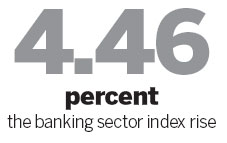A-share market rebounds with banks leading rally
Data suggest smaller lenders post growth of 20% for assets, liabilities
China's A-share market rebounded on Tuesday, with bank shares leading the rally after the biggest drop in almost 20 months the day before.
The benchmark Shanghai Composite Index rose 2.33 percent, or 52.91 points, to close at 2,326.31. Turnover was 116.7 billion yuan ($18.8 billion), down from 143 billion yuan on Monday.
Analysts said institutional investors had swooped to pick up shares, mainly those of banks, after Monday's fall.
"After a rally of several months most investors have boosted their confidence that the A-share market has been on a bull run," said Ai Tangming, an observer with Sina Finance.
Monday's plunge came after the authorities announced a further clamp down on the property market, including an order for individuals selling real estate to pay a 20 percent tax on gains. More than 50 listed property developers hit their 10 percent daily share fall limits, and banks saw huge falls over fears the new policies may hurt loan demand.
"The sudden fall yesterday (Monday) triggered capital inflow for bargain hunting," Ai said on Tuesday.
The banking sector index rose by 4.46 percent, led by Ping An Bank Co Ltd with a 10 percent increase.
The brokerage-sector index rose by 5.62 percent.

Many analysts said China's stock market may still be in a period of adjustment, but banking stocks may lead a new round of rebounds.
"Bank shares and property shares have led the latest rally in the A-share market. If the rally continues, economic recovery and consumption growth are sure to sustain," Liu Jun, an analyst with Changjiang Securities, wrote in a note.
China's stable economic situation will give the best support to booming banking stocks and investors' confidence.
The National Bureau of Statistics has reported that gross domestic product increased by 7.8 percent last year, the slowest since 1999. But it was still higher than growth rates in most other major economies last year.
"The increasing amount of renminbi loans is good news for banking stocks," said Yang Delong, chief analyst in the strategy department at China Southern Asset Management Ltd, a Shenzhen-based brokerage.
"China's economy is picking up. It is continuing to expand, while the investment confidence of China's enterprises has started to recover, so the needs of credit funds will then rise," Yang said.
He added: "China's banking stocks play an important role in driving the stock market, because they have huge market capital. Thus, a rise in banking stocks will lead to a rise in the market as a whole."
Figures from the People's Bank of China, the central bank, show that total renminbi loans amounted to 1.07 trillion yuan in January, the highest level since Feb 2010.
Analysts said increasing demand for internationalization of the renminbi may also be a factor in boosting the banking sector.
There are also rumors that central bank chief Zhou Xiaochuan looks set to stay on after the two sessions of the country's top legislative and political advisory body.
China's banks saw their total assets rise 17.7 percent year-on-year to 131.27 trillion yuan at the end of 2012, according to latest official data.
The growth was slightly lower than the 18.3 percent recorded a year earlier, according to figures from the China Banking Regulatory Commission.
Smaller lenders, including joint-stock commercial banks and city commercial banks, posted annual growth of more than 20 percent for both assets and liabilities, more than double the expansion rate of large lenders, said the commission.
Lucy Feng, Nomura co-head of regional banking and research for Asia excluding Japan, said she and her team raised their forecast for China banks by 15 percent for 2013 and 14 percent for 2014, as the improving macro outlook is shoring up loan demand and yields while moderating non-performance loan risk and lowering credit costs.
Contact writers at [email protected] and [email protected]























